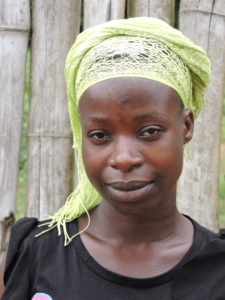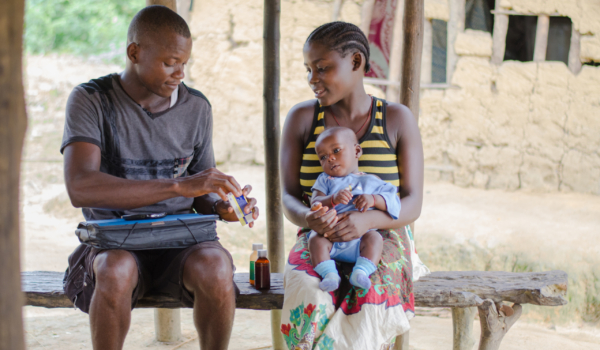Patience Suzar grew up in Tuglor, a remote community in Konobo District, where she attended school through grade 9. A mother of four – two boys and two girls – Patience is a determined young woman, committed to supporting her family. For years she did so by farming a clearing in the rainforest, but in 2012 Patience heard about Last Mile Health, a local organization that was providing jobs and healthcare in local villages.
In July of that year, a Last Mile Health recruitment team visited Tuglor looking for new candidates for its Community Health Worker training program. Eager for an opportunity that would allow her to support her children and help her community, Patience took Last Mile Health’s literacy test and attended an interview. Her skills and ambition were recognized and she was invited to attend a training session.
“I was selected to come for the training,” she explained, “so we can treat children so that they don’t die from the illnesses they are not supposed to die for.” Patience explained that prior to this, children in her community had no access to treatment for illnesses like malaria, diarrhea, and acute respiratory infections. “You needed to get to [Ziah] town (the district capital, where there is a health facility), and you could die for lack of transport,” she said, but now “Last Mile Health provides every treatment in [Tuglor] town.”
Patience was among the first Community Health Workers trained by Last Mile Health and the Liberia Ministry of Health, and now balances farming with providing for the health needs of her community. On weekdays, she typically spends five hours per day working as an CHW, which includes raising awareness among her neighbors about Ebola, screening for illnesses, providing basic treatments, tracking pregnancies and movements, referring at-risk pregnant women to the local facility, and following up with recently treated patients.
One of the challenges of her work, she says, is that she can be called upon to attend to sick patients at any time. “If I’m going to the farm, people have to bring me back, if I’m cooking, I leave the food to treat the children… even in the night.” It’s a lot of responsibility to think, “If I leave from the town [for farming], who will treat [sick patients]?” This challenge is worth it though, she reflects: “I became an CHW to save lives. It wouldn’t be possible [for children to get treatment], but Last Mile Health made it possible.”
Patience recognizes that the impact of her work on sick children, saying, “when I give the medicine, they cannot die from that sickness.” Though she could not complete her last three years of high school for lack of funding, she see Last Mile Health training as an opportunity to advance her skills and to provide comprehensive healthcare to her community. In the future, she looks forward to receiving ongoing training from Last Mile Health so she can learn to provide family planning and adult health services to her community.
Though the challenges of providing care in such a remote location remain ever present, Patience continues to diligently serve Tuglor. When asked what recommendations she would give to new Community Health Workers, Patience said, “If they are selfless, they will be successful.”





